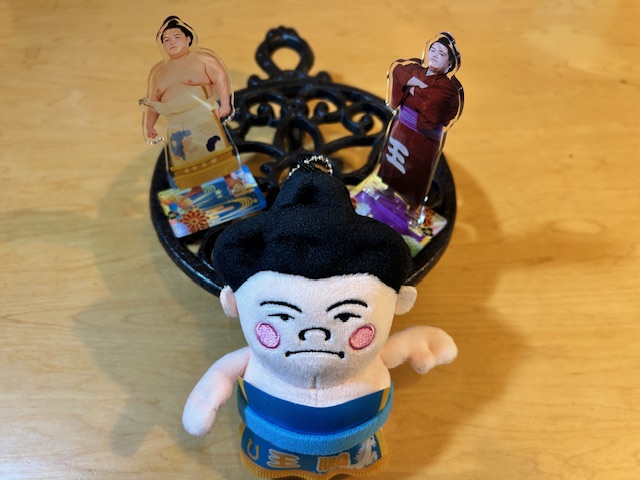A sumo event was recently held in London, and according to news and media coverage, it was a huge success. I was delighted to see sumo—a traditional Japanese sport and cultural ritual—introduced overseas and capturing the attention of so many people. It was fascinating to watch familiar rikishi (wrestlers) scattering salt in the prestigious Royal Albert Hall, a venue more often associated with classical concerts, musicals, and ballet.
Foreign media reported, “It was amazing to see these powerful wrestlers up close—the energy was completely different from watching on TV.” But that’s not entirely accurate. I heard that a director from the Sumo Association told the wrestlers, “Even though we’re abroad, don’t take it easy—make it look serious.” In the Japanese context, this kind of instruction means, “You know what I mean—look serious, but don’t actually go too far.” The wrestlers must have found that balance quite challenging.
In Japan, match-fixing—what we call “considerate sumo”—has decreased significantly, which is a good thing. But as a result, injuries have increased. If they fought with the same intensity overseas, someone in the front row might get hurt! So naturally, they had to find a middle ground: serious enough to show the spirit of sumo, but careful enough to avoid accidents.
Usually, in Japan’s six annual tournaments, many wrestlers wear supports on their knees, ankles, or wrists from old injuries. But in London, none of them did—probably for appearance’s sake. Even though they weren’t fighting at full force, Japanese fans watching from home must have been nervous seeing them without protection. Personally, I was happy to see Tobizaru, the handsome wrestler who had seemed discouraged after a recent scandal, back in good form and gaining attention as “Flying Monkey.” The name sounds odd or even a bit controversial in English, but it’s actually his real shikona (ring name).
The BBC reported that, in Japan, sumo is often viewed as a sport for older people and is not particularly popular among younger generations. That’s partly true—sumo life is strict, hierarchical, and physically demanding, and only a few wrestlers become stars. But to say sumo isn’t popular is totally wrong. In fact, Japan is experiencing a sumo boom. Tickets are nearly impossible to get; even the back-row seats are lottery-only, and I never win! After the final day, the stables’ celebration parties are always packed with devoted female fans known as sūjo.
Sumo is both a sacred ritual and a sport, which makes it deeply complex. It reflects Japan itself—its traditions and evolutions, its public face and private realities, its light and its shadow. That’s what makes it so fascinating.
And still, what makes me truly love sumo is the wrestlers’ sincerity. Their dedication shows not only in their training, but also in their daily lives—cooking, cleaning, making the ropes for seniors’ belts, maintaining the stable’s ring, and interacting politely with neighbors. They never cut corners and live each day with quiet discipline. In their diligence, I see something that modern society—always chasing money and efficiency—has forgotten. Sometimes, when I share a train car with a lower-ranked wrestler, the faint scent of bintsuke hair oil reminds me why sumo still feels magical.
大相撲ロンドン場所があり、ニュースやメディア報道で目にするかぎり、大盛況であった。
また、音楽やバレエのイメージがあるロイヤルアルバートホールで、私にとっては馴染みの力士が塩を撒いている様子は、ちょっと面白かった。海外メディアでは「体格の良い関取の真剣勝負が見られて素晴らしい、テレビで見るのとは違う力強さが伝わってくる」と伝えていたが、これはもちろん実際とは違っている。
同行した相撲協会のT理事が「海外だからと言って適当にやるな、真剣勝負をやれ」と力士たちに伝えたらしいが、これはすなわち「真剣にやっているように見せなければならない、わかっているな」という日本的なお達しなのだから、力士たちは相当苦労しただろう。
少し前と違って日本の大相撲では八百長(忖度相撲)というものはかなり減ってきている。しかしそのせいで、真剣勝負のあまり怪我をする力士があとを絶たない。海外でもし日本でやっているような真剣勝負をしたら、勢い余って土俵の近くのお客様をケガさせるかもしれない。力士の方も海外滞在中のケガは避けたい。ある程度は真剣にある程度は場をわきまえて、というスタイルになるのはやむを得なかっただろう。
実際に日本で開催される年6回の場所では、古傷のサポーターは許されているが、今回のロンドン場所でサポーターをしている力士はいなかった。見た目を気にしてのことだと思うが、100%本気ではないとはいえ、サポーターを外して勝負している過去の傷を持つ力士に、日本のファンは冷や冷やした。
個人的には少し前のスキャンダルですっかり元気をなくしていたイケメン跳猿関が協会の指示もあったのか、「Flying monkey」として人気になったことはちょっと喜ばしかった。Flying monkeyは差別的な響きもしたけれど、本当の四股名なのでそこはなんとも。
日本では相撲は年寄りにしか人気がないとBBCでは伝えていた。確かに集団生活で上下関係も厳しく、力士になりたがる若者は少なくなっていることは事実。
ただ、それで相撲は人気がないのかと言えば、それは大きな間違いで、むしろ今は日本ではかなりの相撲ブームが起こっていて、実際相撲チケットは全然取れない。一番後ろの席さえ抽選に当たらない(お茶屋さん使えば別)。千秋楽後の各部屋の打ち上げパーティは後援会の「すーじょ」であふれている。
相撲に日本の伝統儀式とスポーツの両側面があるこのから、外国人力士の問題や収益の問題等、なかなか一筋縄では解決できない問題も多く抱えている。
歴史と進化、本音と建て前、光と闇をぎゅっと濃縮させた「ザ・日本」=これぞニッポンと言ってもいい。
それでもなお、相撲を私が愛せるのは力士のひたむきさを見るからだ。稽古の頑張りだけではない。料理当番の一つ一つ、掃除の一つ一つ、兄弟子のまわしのサガリ作りから部屋の土俵づくり、ご近所とのかかわりなど、すべてを便利なやり方で「ま、いいか」とプロセスをすっ飛ばすことはせず、いったいどこに気力が残っているのだろうというくらいの丁寧さで毎日を前向きに生きている。なんだかそこにマネーゲームを追い続ける現代人が忘れてきたものがあって、心を掴まれるのだ。
たまに同じ車両で力士に遭遇した時、漂ってくるあのびんつけ油の匂いにフラッとする。あの香りも実は相撲の魔法の一つなのかもしれない。



